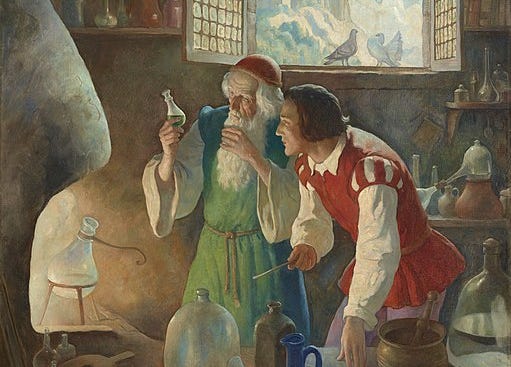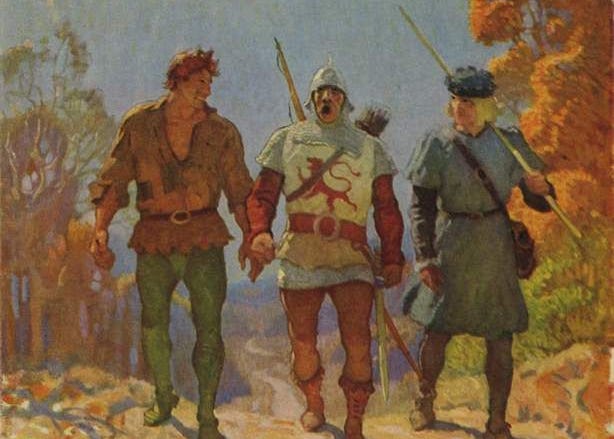In which I continue to talk about counterproductive practices of treating them as if they were the same sort of medium.1
A novelist can take as long as he likes to write. And can go back and revise. He can lop days, months, years off any part of the story, from concluding it starts too soon, or deciding the dead time can be passed over. Or he can insert them, even if he had put in that it was a week from the discovery of the king's heir to the coronation, so that it's actually a year and a day. Having devised half a dozen ways out of a pickle, he can go back and use the seventh to give the story a good shape.
In opposition, the DM doesn't have to make it all up himself.
The most obvious situation is when the characters have been painted into a corner. The captured bard (as in a meme I once read) is offered to the dragon by cultists, and the other players' attempts to save the day have run into bad dice rolls. The bard's character offered the cultists to the dragon, and the amused dragon accepted them and spared the bard.
In a gaming session, something like this can work to save the day in an impossible situation, IF the player, or the DM is quick on his feet. But the reason why this one became a meme is that improvised solutions like this are rare, and even among those rarities, perfect, gem-like solutions that fit the campaign perfectly are rare.
But the novelist can put the whole story (or outline) on the shelf until he comes up with an adequate resolution. He can bounce the notion off other people and see who comes up with a brilliant notion. He can decide that after all, making the bard a bard makes it too difficult and go through the process of turning him into a wizard. And if he concludes that having the bard die doesn't work, but having the bard survive that way, or any other, doesn't fit the story's plot, mood, or theme, he can resolutely wipe out the bard's capture -- even if he comes that to conclusion after fifty thousand more words.
Part of the issue is that in a novel, the resolution does have to fit the plot, mood, and theme. If the D&D bard spots a magical gate to another plane in the dragon's lair and hops through, reaching safety but derailing their quest for a magical sword while the party hunts through the planes to find him, well, they can go hunting through the planes. Perhaps they will return to find another party completed the quest. Perhaps everyone will forget about the original quest. This would take real art to pull off in a novel. Probably take more revision than removing the bard's capture, unless it was built in from the beginning.
Likewise, if the characters really, really, really need a certain magical object, not only can the novelist ensure that they fought the right monster to find it, and choose to keep it, he can go back and retroactively put it into the hoard (or shop, or mentor's armory). In a session, the DM is pretty much stuck with planting it again, near the problem, or having a magical object (even if apparently non-magical) suddenly manifest the right powers under the right circumstances.
At most the DM could have craftily planted items in situations where the players were likely to carry them without determining what the object can do. Then the DM is free to retroactively declare it's the object needed.
The novelist, of course, can also make an object manifest powers under the right circumstances. Then he can go back and plant the foreshadowing to make it plausible and not a rabbit pulled out of a hat. Players care less about foreshadowing.
The downside is that players may care passionately about something that was indeed as a throw-away, and then the DM has to run with it. I have seen a sage soul advise players and DMs that games are more like improv sessions than writing a story. Once something has happened that derailed your notions, you have to throw away your old notions and go on.
I have heard of gaming sessions where a DM pronounced a path dull and they agreed to erase some portion of the game, but that's limited -- going back and putting in a scene between the first adventure and the second when you are on the tenth is not really feasible -- and what's more, it's rare. Much more rare than the DM who bestows magical items on the party in glee and abundance just to see what sort of original solution the players can dream up with them.
With good players. There is many a DM who suffered through players who looked blankly at the DM and expected a solution to fall into their lap even while they overlook the possibilities about them, or deride the inscription that gives them the clue.
Mind you, a writer's characters can do that, but the writer is under much less time pressure. And has the power to change the character of the character who derided the inscription, or the other characters who let this one bully them, either over all, or through a character arc. And if that is not aesthetically sound, the writer can kill or disable the bully before the scene.
Fundamentally, the writer is not related to the story time the way the DM and players are. This produces many changes.
having started here.
The DM vs. The Writer, In Character
Every mode of story-telling -- movie, novel, comic book, role-playing game -- differs in what it can tell, and how it can tell it. Learning how to do one may habituate you to useful skills, and to positively counterproductive practices, for another.






I recall a particularly cringey attempt in my early DMing years where I figured I could just take a novel I was working on and turn it into a campaign because the plot was fun and worked with a party. I have since learned better! What works in one medium won't in another, and even the way information is given to players vs. a reader is different.